Brexit referendum – the sequel?
A pro-Remain campaign bus mocking the Brexit slogan from the referendum struggled through back lanes of Westminster for a photo op this morning. Wedged between cars as the bus driver executed a 50 point turn, one campaigner on the bus said: “Oh no, this is going to be the story.”
In front, a waiting firing squad of cameras suggested that might be on the money.

The bus was the idea of a crowd-funded campaign calling itself “Is It Worth It Bus,” the work of one of a multitude of groups that have sprung up in recent months. They range from Scientists for Europe to something rejoicing in the acronym OFOC.
There’s a coordinating committee that regularly meets, perhaps a little unwisely, at the European Commission headquarters in London. But attempts to merge these structures into one coordinated campaign have foundered.
Mark Malloch Brown, Chairman of the most loaded of the groups, Best for Britain, suggests in an interview for Channel 4 News tonight, that his group has the clearest message while some of the others dabble too much in “soft Brexit” and are maybe not as “clear minded” about the research as Best for Britain.
One man who has been working on trying to get all the groups together is Michael Young, until recently the interim Chief Executive of the European Movement. Mr Young was the businessman who secretly organised the early meetings between the ANC and the South African government (dramatized in the Channel 4 film “Endgame”). Bringing together the diverse pro-EU groups here has proved a challenge beyond him. Mr Young insists he hasn’t given up yet but acknowledges time is short.
Talk to senior campaigners in the biggest of the pro-EU groups and their scenarios for staying in the EU tend to be based on one central event: the vote in parliament that the government must call after a deal is agreed.
To win that, campaigners say, they want to embolden Tory MPs to vote against their own party in a critical (and potentially lethal) vote for the government that should come soon after any deal is signed. If MPs think public opinion has changed, the logic runs, they might feel licence to vote against the whip.
On the back of that defeat, campaigners say, you could have a change of Prime Minister, even a new election. But their central hope is that defeat would trigger a second referendum.
Their polling suggests they mustn’t call it “a second referendum.” The phrase is electorally toxic. Even senior figures in the pro-EU campaigns can barely stand the thought of re-running the campaign. Polling suggests it must be called “a vote on the deal,” and then you have a chance of winning people over to the idea of another national vote.
But they are a long way right now from being in a position to win a popular vote even if they managed to win the case for a referendum.
One insider says, based on extensive polling: “We can get 55/45 victory against ‘no deal’ but that lead disappears the moment there’s some kind of deal on offer.”
Central to the Remainers’ hopes of gaining the lead is re-energising some who voted Remain back in 2016 but are now resigned to Brexit, reluctant to rock the boat. They are estimated to be some 10% of the population. Remain campaigners think there’s been some churn and they’ve won over some ex-Leave supporters now alarmed at the prospect but that swing has been neutralised by lost Remainers. They are in their mid-30s to mid-40s, they could be teachers, NHS workers, council workers and so quite typical of the general demographic that helped Remain get up to 48% of the vote last time. But, crucially, they are living in the Midlands and the North of England in areas where there was a strong Brexit vote. They are keeping their heads down, don’t want to draw attention to themselves, don’t advertise their vote and dread a re-run of the 2016 contest.
That, campaigners say, is the nut they must crack to swing public opinion which then emboldens MPs who privately dread Brexit and ushers in a second referendum. It’s a tumultuous sequence of events that could see Brexit postponed while Brussels waits for the UK to sort itself out. It’s a scenario built on many challenging assumptions. Two senior campaigners told me they didn’t really think any of this was going to work but it was worth a try. But the second referendum triggered by a Commons defeat on the deal is the central strategic goal that unites the diverse groups at work on pro-EU campaigns and if their dreams came true it could make the last eventful couple of years look quite humdrum.
